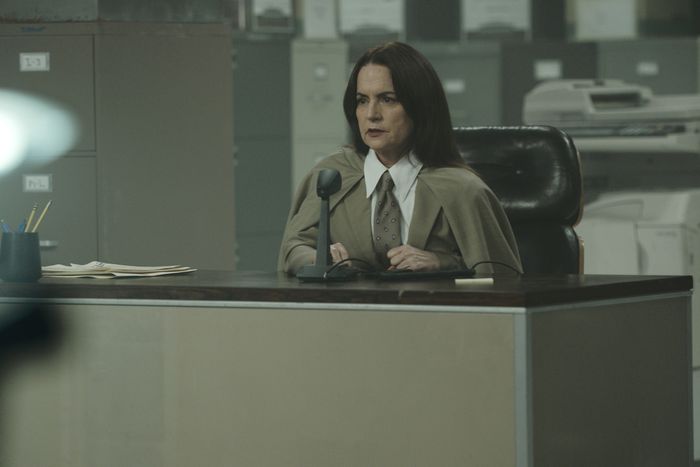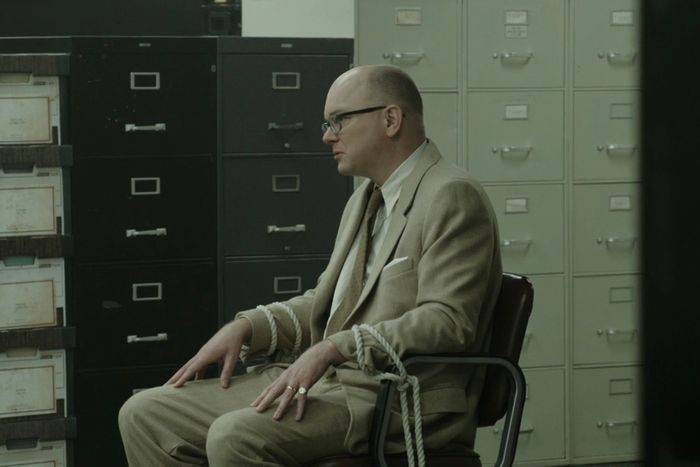
In What We Do In The Shadows’s season-one episode “City Council,” Nandor, Laszlo, Nadja, Guillermo, and Colin Robinson attend a public meeting of the Staten Island Borough Council to attempt a bureaucratic takeover of the region. Robinson, an interminable “energy vampire” who nourishes himself on the thinning patience of those around him, uses the assembly as an opportunity to “mass feed,” fiddling tediously with the podium’s microphone, reading out dictionary definitions, and droning on about byzantine bylaws until everyone in attendance is nearly unconscious and he is sufficiently full. “I come here every week,” he explains. “It’s a smorgasbord of banality and despair.”
In Shadows’s recent season-five episode “The Campaign,” the show’s writers once again place Robinson in a bureaucratic setting to mine the comedic potential. But thanks to the show’s thoughtful evolution of his character, the conceit sidesteps the monotony that Robinson’s victims can’t. It acts as an injection of epinephrine that replenishes the comedic well so that it’s ready to be drained again.
Animated with a perfect midwestern glaze by Mark Proksch, Robinson was initially conceived for a single joke about the different types of vampires that exist in the Shadows universe. “He was going to be a guy who you didn’t see that often, but lived in the basement,” showrunner Paul Simms told Vulture in 2021. The writers were concerned that Robinson’s sole personality quirk was not enough to make him a main player: “We were like, we can’t keep doing that over and over again, so we started expanding.” One of the ways the show introduced three-dimensionality to Robinson was by placing him in a diversity of settings — Super Bowl parties, online forums, and, yes, council meetings — and exploring all the unique opportunities for irritation each of these things present. Another tack the writers took was sending him on adventures with different combinations of the ensemble; Robinson and Laszlo’s unlikely team-ups in season three made for a particularly satisfying dynamic. Then, leading up to the start of season four, the show did a hard reset. Robinson was reborn as a baby, offering the writers ample opportunities to find ways for him to grate on others as a child. He started all his sentences with the words “guess what?,” launched YouTube channels about Lego, and developed a tiring obsession with musical theater.
By the outset of season five, however, Robinson had reverted to his regular adult form, and there was cause to wonder whether the writers would continue to find ways to develop his arc. He was back in the workforce, draining people while working as a waiter, but it all felt a little similar to his workplace experiences in earlier seasons. That is, until “The Campaign,” in which Robinson, seeking out new opportunities to feed, runs an election campaign for the post of local comptroller. He reunites with an old fling, emotional vampire Evie Russell (Vanessa Bayer), and together they set out to oppose councilwoman Barbara Lazarro — running on a platform of eliminating bureaucracy — or at least drain as many potential voters as they can in the process. Their plan appears to be going smoothly when suddenly they’re abducted off the street and smuggled into a clandestine, soulless office to meet with the Supreme Council of Energy Vampires. Suddenly, the drainers become the drainees, as Robinson finds himself on the other side of the “banality and despair” smorgasbord.
The councilmembers, played by a murderers’ row of alternative-comedy heavyweights — Jo Firestone, Gregg Turkington, Hannibal Buress, Aparna Nancherla, and Martha Kelly — inform Robinson that he must win the election to preserve the health of the bureaucracy that sustains energy vampires everywhere, in the process subjecting him and Russell to their insufferable dynamic. Firestone’s character’s phone keeps dinging at inopportune times, Turkington attempts to explain to her in excruciating detail how to deactivate her notifications, Buress continuously stymies progress by feigning obliviousness, and an inaudible Nancherla insists on speaking into a inoperative microphone. “My god, they are fantastic,” Robinson admits with begrudging respect.
In a lesser show, this parade of cameos could be seen as cheap stunt casting. But Buress, Nancherla, Firestone, Turkington, and Kelly are all comics who’ve been referred to (sometimes reductively) as “deadpan,” making them ideal choices to play energy vampires who have to get laughs without overselling laugh lines. With poorer writing, the councilmembers’ hokey stabs at humor (“okay, boomer”), painstaking attention to detail, and lack of technical proficiency might veer too close to Robinson’s own, making them fall flat. Instead, they build upon one another, crescendoing into a feeling of visceral discomfort that transcends that of previous episodes.
But irrespective of these details, what makes this scene notable is the way it signals how much unexplored territory there remains for Robinson’s character to venture into — an entire world of energy vampires we’ve yet to see. Five seasons into its run, Shadows is still finding inventive ways to build out its world around Robinson’s limited character motivations. He may drain the energy of the other characters, but the show knows how to ensure he doesn’t drain the audience’s energy, too.



